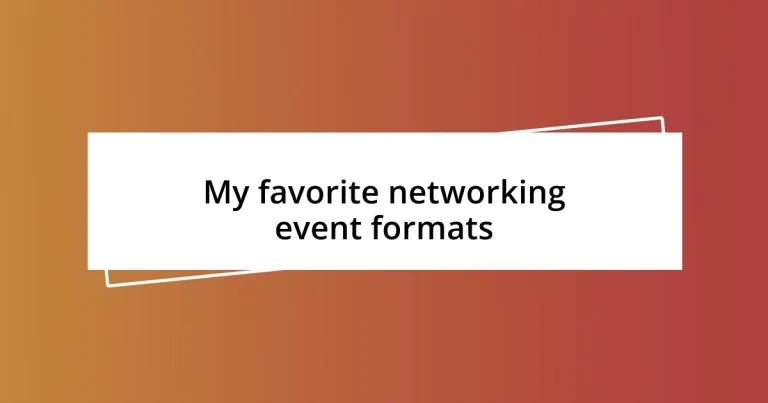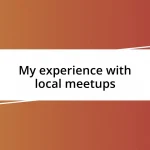Key takeaways:
- Networking events are essential for building valuable relationships and gaining insights that can significantly impact your career.
- Structured networking formats enhance interactions by providing deeper connections, efficient use of time, and a boost in confidence for participants.
- Successful networking requires effective hosting practices, engaging activities, and diligent follow-up to foster lasting connections and measure success through feedback and engagement levels.
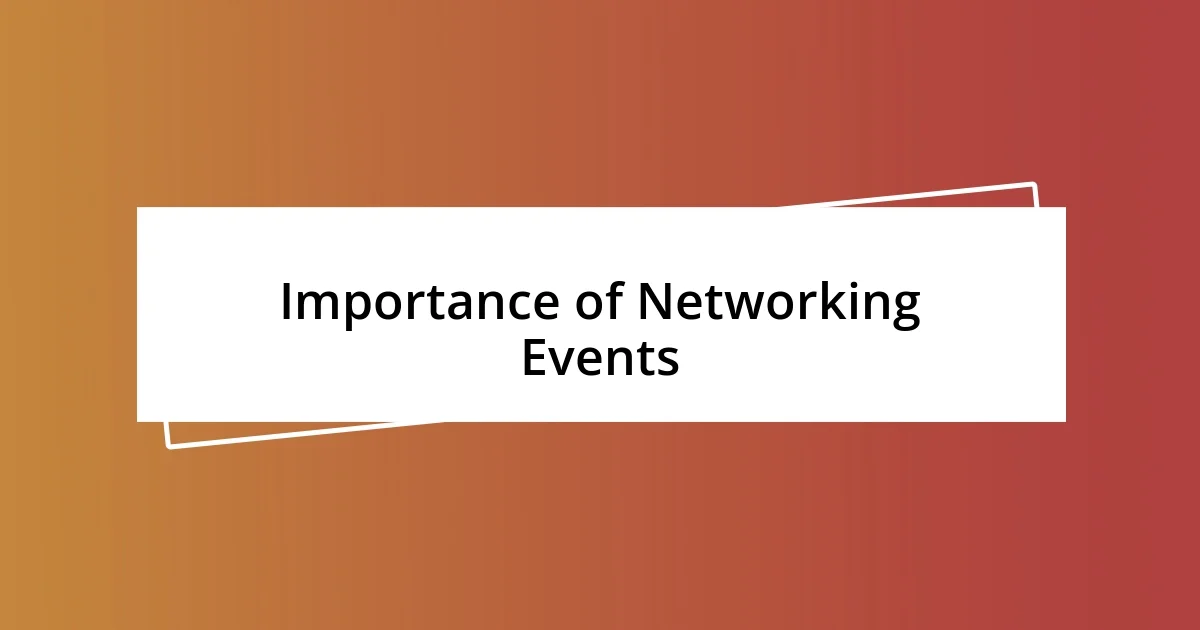
Importance of Networking Events
Networking events serve as invaluable platforms for building relationships that can lead to career advancement. I remember attending a local tech meetup and striking up a conversation with a seasoned software engineer who later became my mentor. Isn’t it interesting how a single encounter can open doors you didn’t even know were there?
These gatherings often foster a sense of community and shared purpose, which is something I’ve personally felt at every event I’ve attended. There’s an electric atmosphere where ideas flow freely, and inspiration is abundant. How many times have you left an event sparked with new energy and direction?
Moreover, networking events provide a unique opportunity to gain insights from others in your field. I once learned about a unique tool from a fellow attendee that transformed my workflow. Have you ever wondered how many game-changing ideas are born from casual conversations at these events? They truly hold the power to shape your professional journey in profound ways.
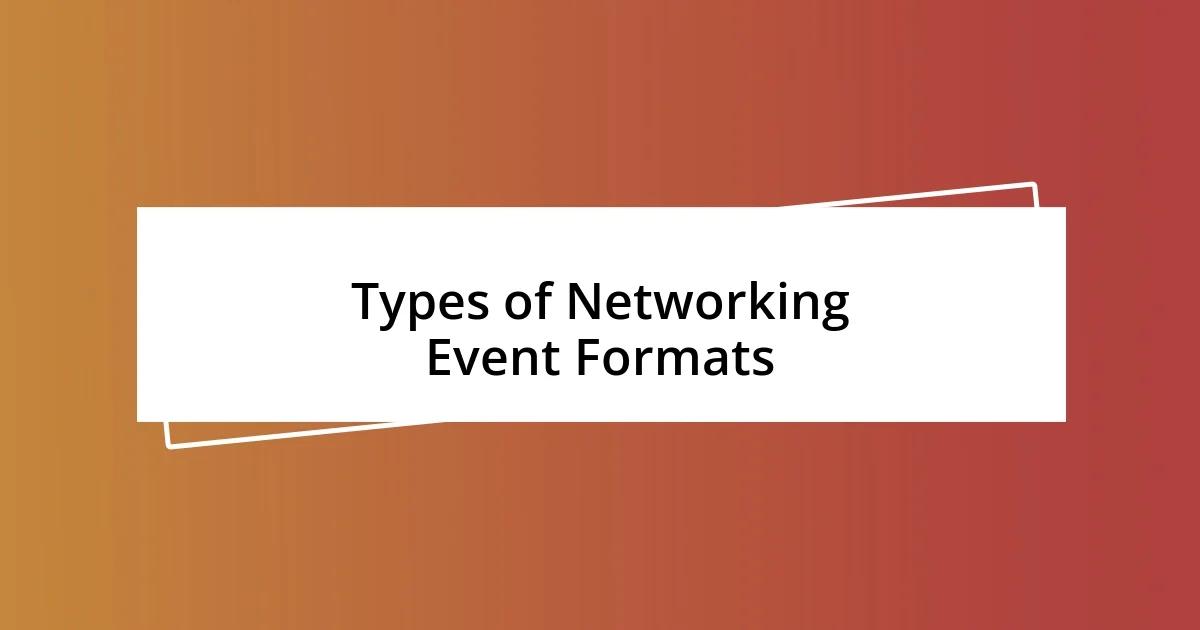
Types of Networking Event Formats
There’s such a diverse range of networking event formats, each offering a unique vibe and set of opportunities. For example, I’ve found that roundtable discussions create an intimate environment where participants can dive deep into topics. I remember one time at a roundtable focused on emerging technologies; the exchange of ideas felt so collaborative, almost like a brainstorming session with old friends. It’s interesting how the format can shape the dynamics of interactions.
Here’s a concise list of popular networking event formats:
– Conferences: Large gatherings with multiple sessions, ideal for learning from industry leaders.
– Workshops: Hands-on sessions that encourage skill-building and knowledge sharing.
– Meetups: Casual gatherings focused on common interests, often in informal settings.
– Webinars: Virtual events that allow for a wider reach, perfect for connecting with experts remotely.
– Speed Networking: Quick, timed interactions designed to maximize connections in a short span.
– Social Mixers: Relaxed events that blend networking with fun activities, lowering the pressure to connect.
I personally adore social mixers. They create a laid-back atmosphere that encourages genuine connections. I’ve had some of my most memorable chats at these events, like when I met a startup founder while chatting over hors d’oeuvres. The conversation flowed naturally, which often leads to more meaningful connections than a typical elevator pitch would foster.
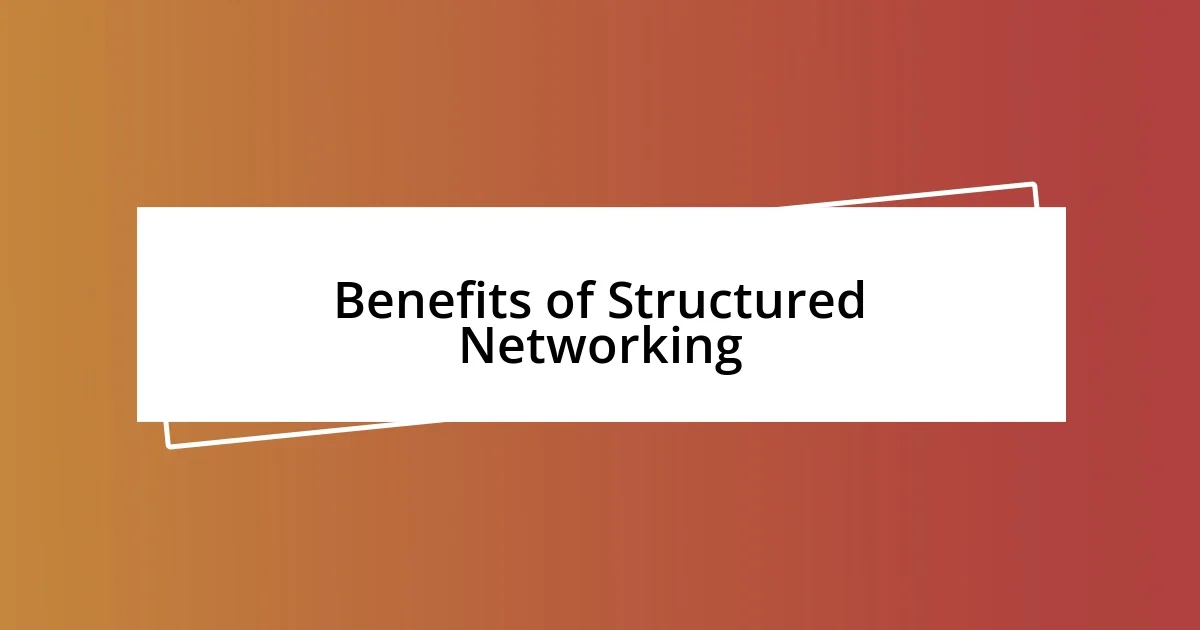
Benefits of Structured Networking
Structured networking provides numerous benefits that can significantly enhance your experience at any event. One major advantage is the ability to foster deeper connections. I recall attending a structured networking session where each participant was given time to share their background and goals. This format not only balanced the conversation but also encouraged us to explore common interests and career aspirations. How often have you found that a simple structure can lead to rewarding exchanges?
Another benefit is the effective use of time. With predefined activities, I’ve often left structured networking events feeling accomplished. For instance, at a speed networking event, I was able to meet numerous industry peers in just one hour. The pace was exhilarating, and I walked away with several business cards and actionable insights. Isn’t it invigorating when efficient formats lead to fruitful outcomes?
Moreover, structured networking can help to boost confidence, especially for those who might feel intimidated in a more casual setting. I’ve noticed that having a clear agenda makes it easier to approach conversations. At one event, I was initially apprehensive but found that the structured activities prompted me to engage more freely. I ended up discussing potential collaborations with someone I might not have approached otherwise. Isn’t it fascinating how structure can empower us to step outside our comfort zone?
| Benefit | Description |
|---|---|
| Deeper Connections | Encourages meaningful exchanges through defined sharing times, fostering common ground. |
| Efficient Use of Time | Maximizes interaction opportunities by structuring formats like speed networking. |
| Confidence Booster | Provides clarity and direction, reducing nervousness and facilitating engagement. |
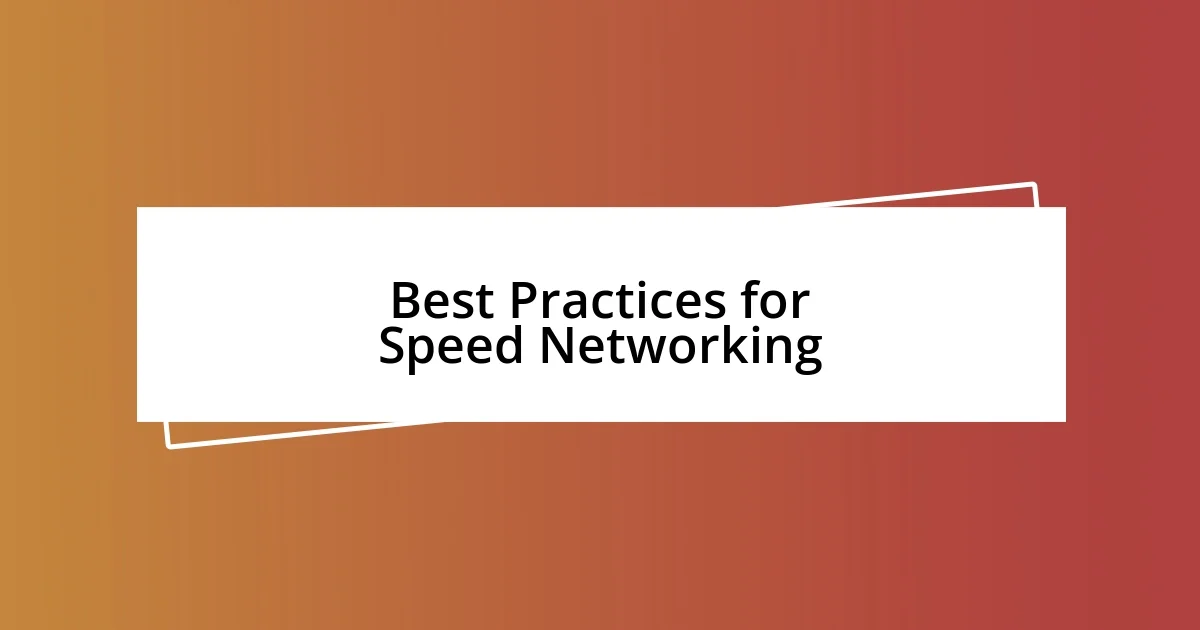
Best Practices for Speed Networking
When participating in speed networking, preparation is key to making a lasting impression. I always suggest having a succinct elevator pitch ready—think of it as your 30-second story. It helps to articulate who you are, what you do, and what you’re looking for in a way that sparks curiosity. Have you ever felt that rush when someone responds with genuine interest? That initial connection is invaluable, and clarity is your best friend in those fast-paced exchanges.
Creating a comfortable atmosphere is another best practice that I’ve found effective. When I attended a speed networking event, the hostess encouraged participants to start conversations with light-hearted icebreakers. This approach not only eased the tension but also allowed for more authentic connections. I remember how a simple question about favorite vacation spots broke the ice and led to a deeper discussion about careers and aspirations. Doesn’t it feel great when you can turn a quick introduction into a meaningful dialogue?
Finally, follow-up is crucial in speed networking. After an event, I make it a point to reach out to the people I connected with, usually within a day or two. Whether it’s a quick thank-you email or a connection request on LinkedIn, this step helps solidify the connection and demonstrates genuine interest. I often find that people appreciate the follow-up; it shows you value the interaction. Have you ever noticed how a small gesture like this can lead to unexpected opportunities down the line? The effort is well worth it.
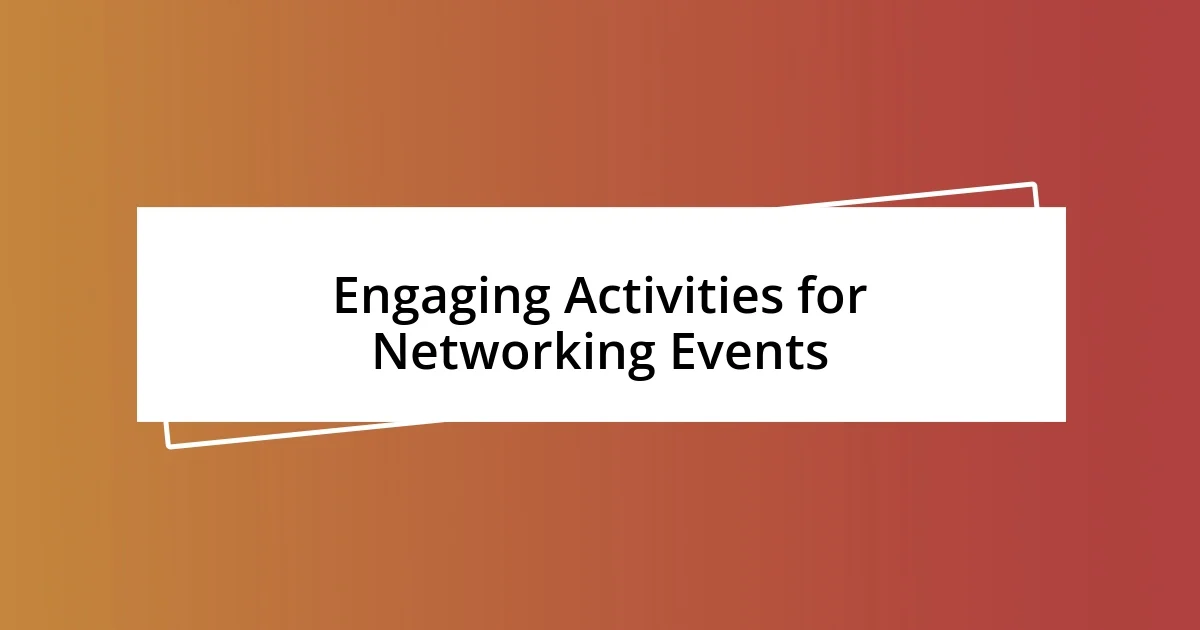
Engaging Activities for Networking Events
One of the most engaging activities I’ve experienced at networking events is team-based problem-solving challenges. I recall a memorable event where participants were grouped to brainstorm solutions to industry-related scenarios. This activity not only sparked creativity but also allowed us to collaborate with new people, leading to lively discussions that extended beyond the initial task. Have you ever felt that rush of excitement when solving a problem together? It deepens connections in ways formal introductions just can’t match.
Another fantastic format is the “skill swap” session. Attendees list their skills, and everyone has a chance to exchange knowledge with others. I once found myself teaching someone about digital marketing while learning about coding from another participant. It’s this kind of reciprocal learning that often leaves both parties invigorated and eager to keep the conversation going. How empowering is it to walk away not just with new contacts, but tangible skills as well?
Lastly, incorporating fun elements like interactive games and icebreakers can transform the energy of an event. I’ve participated in activities like “networking bingo,” where I had to find people who fit specific criteria, such as “someone who has lived abroad.” It kept things light-hearted and encouraged conversations that I might not have initiated otherwise. Isn’t it refreshing when networking feels more like a social gathering rather than a stiff business meeting? Engaging activities create a vibrant atmosphere that fosters authentic connections.
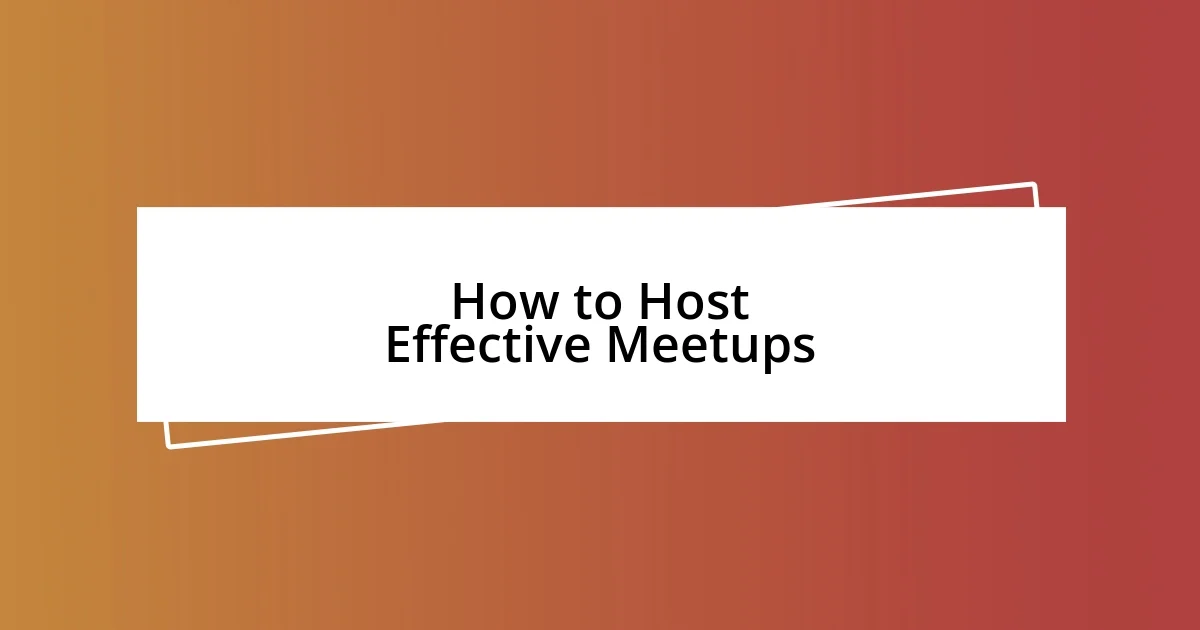
How to Host Effective Meetups
Organizing effective meetups starts with understanding your audience’s needs. When I once hosted a small gathering for aspiring entrepreneurs, I deliberately tailored the agenda to include a mix of expert panels and open discussions. This approach not only respected their time but allowed ample space for people to share and explore ideas collectively. Isn’t that the kind of environment where magic happens?
I’ve discovered that setting a welcoming tone right from the beginning can really draw people in. At one of my meetups, the first thing I did was welcome everyone with a warm smile and a light-hearted anecdote about my own early struggles in entrepreneurship. The laughter that ensued immediately broke any ice, creating a friendly atmosphere. Can you imagine stepping into a room where everyone seems approachable from the get-go? It’s all about fostering connections effortlessly.
Finally, I always prioritize follow-up after my events, which has proven invaluable. I take a moment to send a personalized message to each attendee, thanking them for joining and inviting them to share any feedback. One time, I received a response that turned into a collaborative project, something I didn’t foresee but absolutely cherished. Have you ever found that following up can lead to unexpected partnerships that might transform your professional journey? Trust me, that simple gesture can propel your networking efforts to new heights.
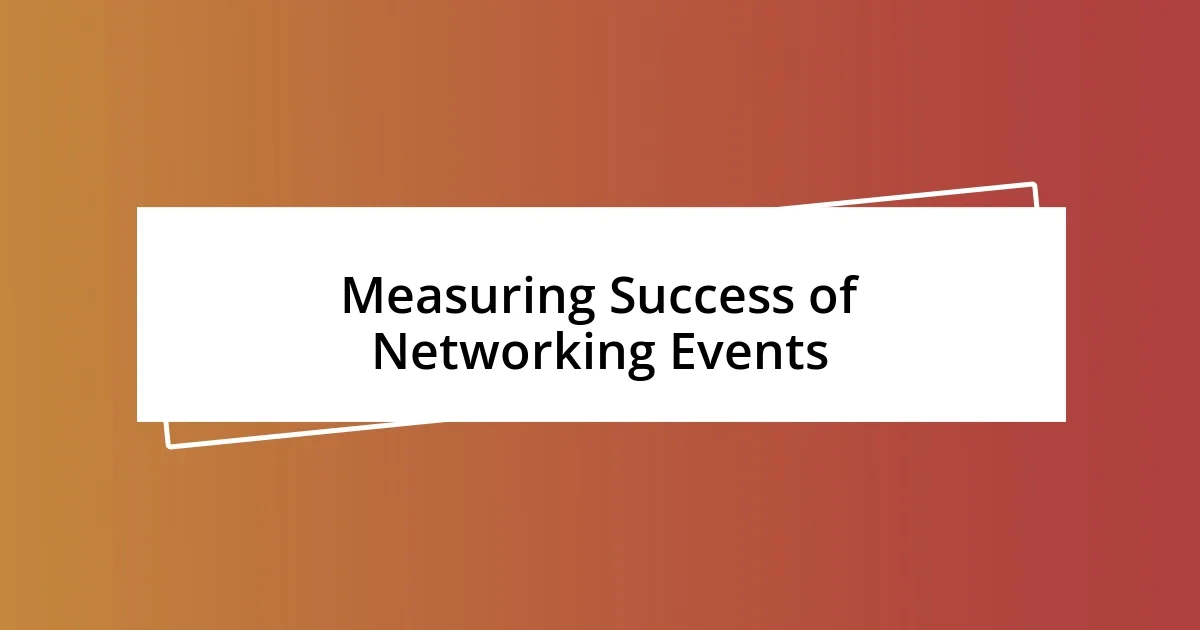
Measuring Success of Networking Events
Measuring the success of networking events can sometimes feel like a daunting task. From my experience, I find that you can begin by looking at attendance and engagement levels. Recently, at a tech meetup I attended, we tracked not just how many people showed up, but also how many engaged in conversations during the event. The buzz in the room was palpable, and it felt rewarding to see so many meaningful interactions unfold.
Another valuable measure is the quality of connections made. I recall a networking event where I received a business card from someone I had a deep conversation with, which eventually led to a collaborative project that significantly boosted my career. Isn’t it interesting how one genuine conversation can lead to something much bigger? That’s the kind of impact we should aim for—connections that have the potential to flourish over time.
Lastly, feedback can be a game-changer in evaluating success. After hosting an event last year, I sent out a quick survey, and the insights I gained were eye-opening. One attendee suggested incorporating more breakout sessions, which I hadn’t considered before. Sometimes, the best way to gauge success is by truly listening to those who attended. Have you ever realized that constructive feedback can reshape future events into something even more remarkable?












